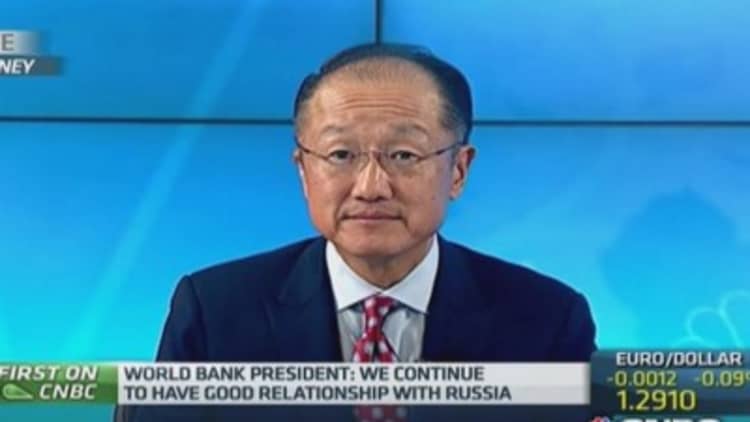The World Bank cut its Russia growth forecast on Wednesday, warning of economic stagnation until 2016.
The international financial institution now sees the Russian economy growing by only 0.3 percent next year and 0.4 percent in 2016.
"Economic activity was already hamstrung by lingering structural problems and a wait-and-see attitude on the part of both businesses and consumers in 2013," said the World Bank in its Russia Economic Report on Wednesday.
"An additional negative impact on the economy―besides slow structural reforms―came from increased geopolitical tensions and an uncertain policy environment."
Russia has been hit by Western sanctions and declining trade following its incursion into neighboring Ukraine this year.
Read MoreEurope's winners and losers from Russia trouble
Both the U.S. and the European Union hit Russia with fresh sanctions this month, including restrictions on the country's large state-owned oil companies operating in Europe. In retaliation, Russia has banned some Western food imports.
Last week, the country's former finance minister forecast that net capital outflows would hit $110 billion this year. In addition, the finance ministry announced it might tap its reserve fund in 2015—for the first time in six years—due to increasing capital flight and falling oil prices.
The World Bank sees growth coming in at 0.5 percent this year, in line with Russian government expectations.

Timothy Ash, head of emerging market research at Standard Bank, described the bank's summation as "pretty realistic".
"The key word herein is 'stagnation', with weak growth drivers, deep-seated structural problems, a lack of reform initiatives," Ash wrote in a research note on Wednesday.
He concurred with the bank that the Russia ruble was likely to weaken over the medium-term, and added that the economy also looked vulnerable to declining oil prices.
Read MoreOPEC cuts Russia's oil supply outlook
"If oil dropped to $80 a barrel I think Russia would look pretty grim, with recession (minus 1-2 percent), deteriorating current account and fiscal positions (budget deficit of 4-5 percent of GDP), heightened capital flight," Ash said.

